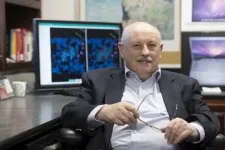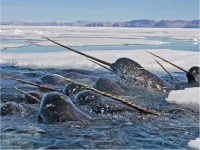Study shows survival mechanism for cells under stress
2021-03-29
(Press-News.org) New research reveals how cancer cells endure stress and survive. Publishing in Molecular Cell, an international research team identified mechanisms that human and mouse cells use to survive heat shock and resume their original function - and even pass the memory of the experience of stress down to their daughter cells.
Lead author Anniina Vihervaara, Assistant Professor in Gene Technology at KTH Royal Institute of Technology, says the results provide insight into the mechanisms that coordinate transcription in cells, which potentially could make a vital contribution in disease research.
The researchers examined how embryonic fibroblast cells and cancer cells responded when subjected to heat shock at a temperature of 42C, using advanced technology to monitor the process of transcription across genes and their regulatory regions. Heat shock causes acute proteotoxic stress due to misfolding and aggregation of proteins. To adjust and maintain stability, stressed cells reduce protein synthesis and increase expression of chaperones that help other proteins to maintain their correct configuration. The heat shock response and protein misfolding are involved in many diseases, including cancer, Huntington's and Alzheimer's.
The mouse embryonic cells used in the study were sensitive to stress and did not survive prolonged or repeated heat shocks, but a model of cancer cells fared better - they survived multiple episodes of stress and maintained their rate of proliferation.
"Cancer cells are professional survivors and that's what we saw in this study," Vihervaara says.
How they did so proved remarkable, she says. The heat shock completely changes the transcriptional program of cells. Within minutes the cells switch to survival mode, inducing hundreds of genes, while repressing thousands more, she says.
Cells retain the repressed genes in a rapidly activable state by pausing transcription machinery at the early part of the gene. Once the stress is relieved, the cells recover within hours by allowing the transcription to continue, and the cell returns to executing its cell-type-specific transcription program.
Yet the revelations didn't stop there. The researchers observed how the cell transmits the transcriptional memory of its reaction to its daughter cells, that is, those cells that bud from cell division.
"Autophagocytosis-related genes in cells were activated faster if the parental cells had experienced stress. These genes help the cell to get rid of misfolded proteins," she says. "Cancer cells also slowed RNA processing at the ends of the genes to reduce the burden for protein production."
Vihervaara's group at KTH's joint research center, Science for Life Laboratory (SciLifeLab), uses a technique (Precision Run-On sequencing) that monitors the progression of transcription at genes and enhancers at a nucleotide-resolution across the genome, followed by advanced data-analyses.
"Our aim is to bring this technical knowledge to physiological settings, where it can contribute to medical research," she says. "But first we need to understand the mechanisms of transcriptional reprogramming in model cell lines before we can understand them in physiological settings."
INFORMATION:
[Attachments] See images for this press release:

ELSE PRESS RELEASES FROM THIS DATE:
2021-03-29
The permanent rise of oxygen in the Earth's atmosphere, which fundamentally changed the subsequent nature of Earth's habitability, occurred much later than thought, according to new research.
And the study, from an international team led by the University of Leeds and including researchers from the University of California-Riverside, Harvard University, the University of Southern Denmark and the University of St Andrews, also provides an explanation for some of the most extreme climate episodes to have affected the Earth, when the planet was repeatedly covered with ice.
The first time oxygen was significantly present in the atmosphere was about ...
2021-03-29
A team of researchers led by Aarhus University and including experts from universities and knowledge institutions in the US, Europe, Japan and Australia has published an article in the prestigious scientific journal Joule confirming that the role of solar photovoltaic installations in future green energy systems ought to be significantly upgraded.
Solar photovoltaic technology has undergone dramatic development over the past 14 years causing the technology to be cheaper already today than has otherwise been assumed in the models that the UN Intergovernmental Panel on Climate Change (IPCC) uses for its 2050 scenarios.
"And ...
2021-03-29
The B.1.1.7 and B.1.351 variants of SARS-CoV-2 were first detected in the UK and South Africa respectively, and have since spread to many other countries. Scientists from the Institut Pasteur joined forces with Orléans Regional Hospital, Tours University Hospital, Créteil Intercommunal Hospital, Strasbourg University Hospital and Georges Pompidou European Hospital to study the sensitivity of these two variants to neutralizing antibodies present in the serum samples of people who have been vaccinated or previously infected with SARS-CoV-2. They compared this sensitivity with that of the reference virus (D614G), which was until recently the most widespread strain in France. The scientists demonstrated that the UK variant is neutralized to the ...
2021-03-29
Until now, historians have treated accounts of extreme weather events that might indicate climate change, or more specifically an increase in rainfall, with suspicion. Too many purely cultural factors, they argue, might have influenced one author or another to write about rains, droughts or floods. A new interdisciplinary study lead by researchers from the University of Pisa and the University of Warsaw, together with an international team of collaborators, links data indicating increased precipitation in northern and central Italy during the 6th century CE to historical accounts contained in contemporaneous texts about the lives and miracles of saints. The paper successfully integrates palaeoclimate proxies with historical ...
2021-03-29
Researchers from Skoltech have developed an early prototype of a medical imaging system that uses neural networks to analyze near-infrared images of veins and project a venous pattern onto a patient's body - this may make blood draws much easier and less of a nuisance for patients with difficult access to veins. The paper was published in the proceedings of the 16th International Conference on Control, Automation, Robotics and Vision (ICARCV).
According to data cited in the paper, out of approximately 20 million blood tests performed globally every day, almost 45% are estimated to involve some degree of discomfort for the patient whose ...
2021-03-29
(Boston)--Pregnancy complications affect up to one in three pregnancies and are increasingly linked to future chronic disease. For example, preeclampsia is associated with a doubled risk of cardiovascular disease, the leading cause of death in the U.S., and gestational diabetes is associated with a seven-fold increased risk of type 2 diabetes. While guidelines recommend preventive care starting within the first postpartum year to address such pregnancy-related health risks, the connections between pregnancy health and future health are often neglected.
In ...
2021-03-29
An international team of researchers led by a University of Virginia School of Medicine professor is warning that scientists must better prepare for the next pandemic - and has developed a plan to do just that.
Noting the "avalanche" of scientific data generated in response to COVID-19, UVA's Wladek Minor, PhD, and colleagues are calling for the creation of an "advanced information system" (AIS) to help scientists integrate, monitor and evaluate the vast amounts of data that will be produced as researchers reveal the molecular architecture of the next pathogen ...
2021-03-29
URBANA, Ill. - Ever thought about buying or building a bat box to help bats? Think carefully about the design and where you put it, University of Illinois researchers say.
Here's why: Bats and their pups can overheat and die in poorly designed or placed bat boxes, and in a warming climate, it could happen more often.
Illinois bat ecologists Joy O'Keefe and Reed Crawford recently synthesized the available data on bat boxes, also known as bat houses or artificial roosts, to raise awareness of the issue and motivate change in bat box design, marketing, and consumer education. Their recommendations are published in Conservation Science and Practice.
"Conservation ...
2021-03-29
A pilot human clinical trial conducted by researchers at Baylor College of Medicine reveals that supplementation with GlyNAC - a combination of glycine and N-acetylcysteine as precursors of the natural antioxidant glutathione - could improve many age-associated defects in older humans to improve muscle strength and cognition, and promote healthy aging.
Published in the journal Clinical and Translational Medicine, the results of this study show that older humans taking GlyNAC for 24 weeks saw improvements in many characteristic defects of aging, including ...
2021-03-29
In the Arctic, climate change and pollution are the biggest threats to top predators like narwals. Studying the animals' tusks reveals that diet and exposure to pollution have shifted over the past half century in response to sea-ice decline. Human emissions have also led to a sharp rise in the presence of mercury in recent years, according to an international team of researchers.
"Our research shows that climate change is having substantial impacts on Arctic ecosystems, with consequences for exposure to toxic pollutants like mercury," says co-author Jean-Pierre Desforges, a Postdoctoral Fellow at McGill University under the supervision ...
LAST 30 PRESS RELEASES:
[Press-News.org] Study shows survival mechanism for cells under stress



